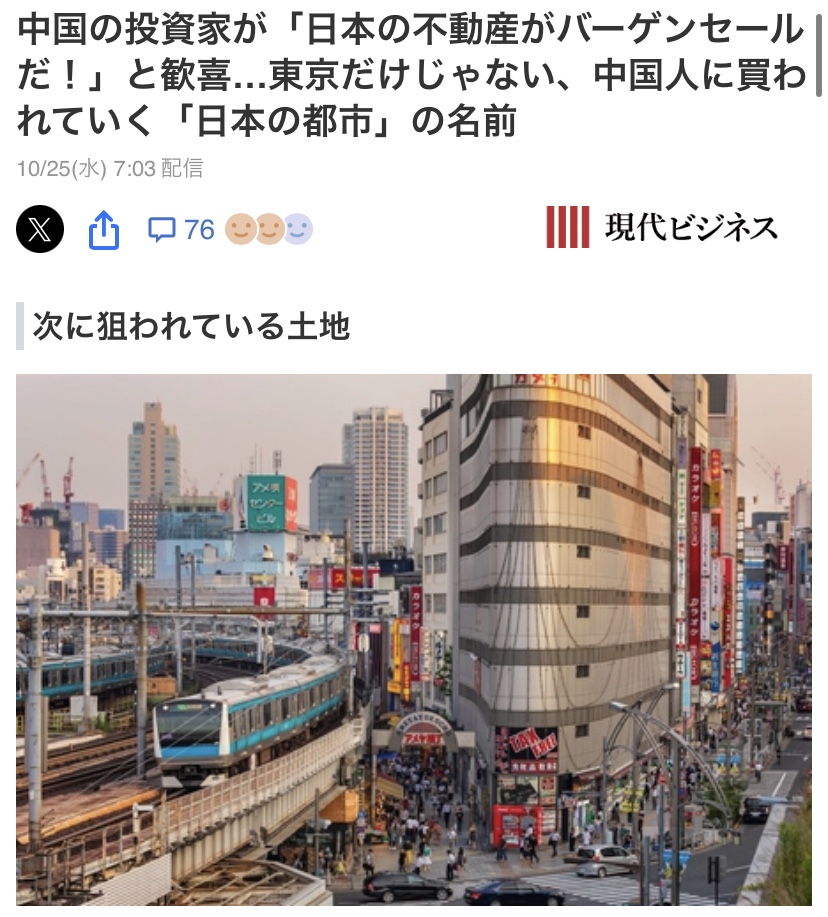In recent years, there has been a noticeable surge in the interest of Chinese investors in the Japanese real estate market. They are not only eyeing Tokyo’s properties but also exploring various regions across Japan. In this blog, we’ll delve into the reasons behind this trend and how Chinese investors are making their presence felt in the Japanese real estate landscape.

Original article: 中国の投資家が「日本の不動産がバーゲンセールだ!」と歓喜…東京だけじゃない、中国人に買われていく「日本の都市」の名前
What’s Driving the Chinese Investment Boom in Japanese Real Estate?
One of the primary factors fueling this trend is the perception that “Japanese real estate is a bargain!” Chinese investors are crossing borders to purchase properties in Tokyo and other parts of Japan, and they are doing so with remarkable enthusiasm. The desire to own a piece of Japan’s real estate market is driven by various facto
Highly Sought-After Property Types
Chinese investors are particularly interested in properties such as used condominiums and buildings located close to train stations. These single-building properties are priced between 200 million and 700 million yen. What makes them so appealing is their higher return on investment compared to new properties, the ability to retain the value of the land, and the freedom to operate them for rental or Airbnb purposes.
Surprisingly, the outskirts of Tokyo are also gaining popularity. The main reason is the potential to run Airbnb facilities in these areas. While the surface yield might be around 4-5%, operating these properties for Airbnb can yield returns of 9-15%. Locations like Omori in Ota Ward, Ayanose along the Chiyoda Line, and Machiya are becoming hotspots for Chinese investors, with property prices ranging from 200 million to 400 million yen.
How Do They Get Their Information?
You might wonder how Chinese investors are so well-informed about the Japanese real estate market. To understand this, we need to look at the role of investment migration consultants who connect these investors with the right properties in Japan. Many of these consultants work with Chinese real estate companies.
For instance, the article mentions an interview with a part-time Chinese real estate agent in Tokyo, who also works at a major Japanese real estate company. He assists Chinese investors in acquiring properties and is paid a commission of 6% of the transaction price upon successful deals. This approach helps build trust with Chinese investors who might be wary of dealing with agents from their own community.
Expanding Beyond Tokyo
It’s important to note that this trend is not limited to Tokyo. Chinese investors are also showing interest in areas such as Chiba’s Boso Peninsula, Saitama’s Kawaguchi, and Kanagawa’s Umakage. Additionally, resort destinations like Karuizawa in Nagano and Tsumagoi in Gunma are quietly gaining popularity among Chinese investors. The pace at which these investors are purchasing properties is so rapid that by the time these regions become widely recognized, most of the promising properties are already sold.
The Impact of the Chinese Real Estate Boom
The increasing interest of Chinese investors in the Japanese real estate market has far-reaching implications. It not only affects property prices but also leads to a transformation in ownership demographics. It’s becoming increasingly common to find that the owner of the condominium next door is a Chinese investor. The Chinese real estate boom in Japan is a fascinating development that will continue to shape the landscape of the country’s real estate market.
In conclusion, the Chinese investment boom in Japanese real estate is driven by a combination of factors, including attractive property types, the assistance of investment migration consultants, and a growing interest in regions beyond Tokyo. This phenomenon is changing the face of Japan’s real estate market and is likely to continue to be a significant influence in the years to come.
Exploring Real Estate Investment Opportunities in Tranquil Toyama
It’s possible that many of you have developed an interest in real estate investment in Japan. While the returns in my hometown of Toyama may not match those in Tokyo, it’s not as competitive as Tokyo, and property prices are relatively affordable, allowing you to invest in multiple properties.
As I’ve mentioned before, Toyama is a convenient countryside location. It’s just a short flight or a little over two hours by bullet train from Tokyo. It offers the beauty of snow in the winter and the opportunity for various water sports in the summer, taking full advantage of its charm (the Pacific side of Japan doesn’t experience snow).
Our real estate agents will guide you through the process.
Related article: Japanese Real Estate Investment Trends and Attractiveness of Toyama



